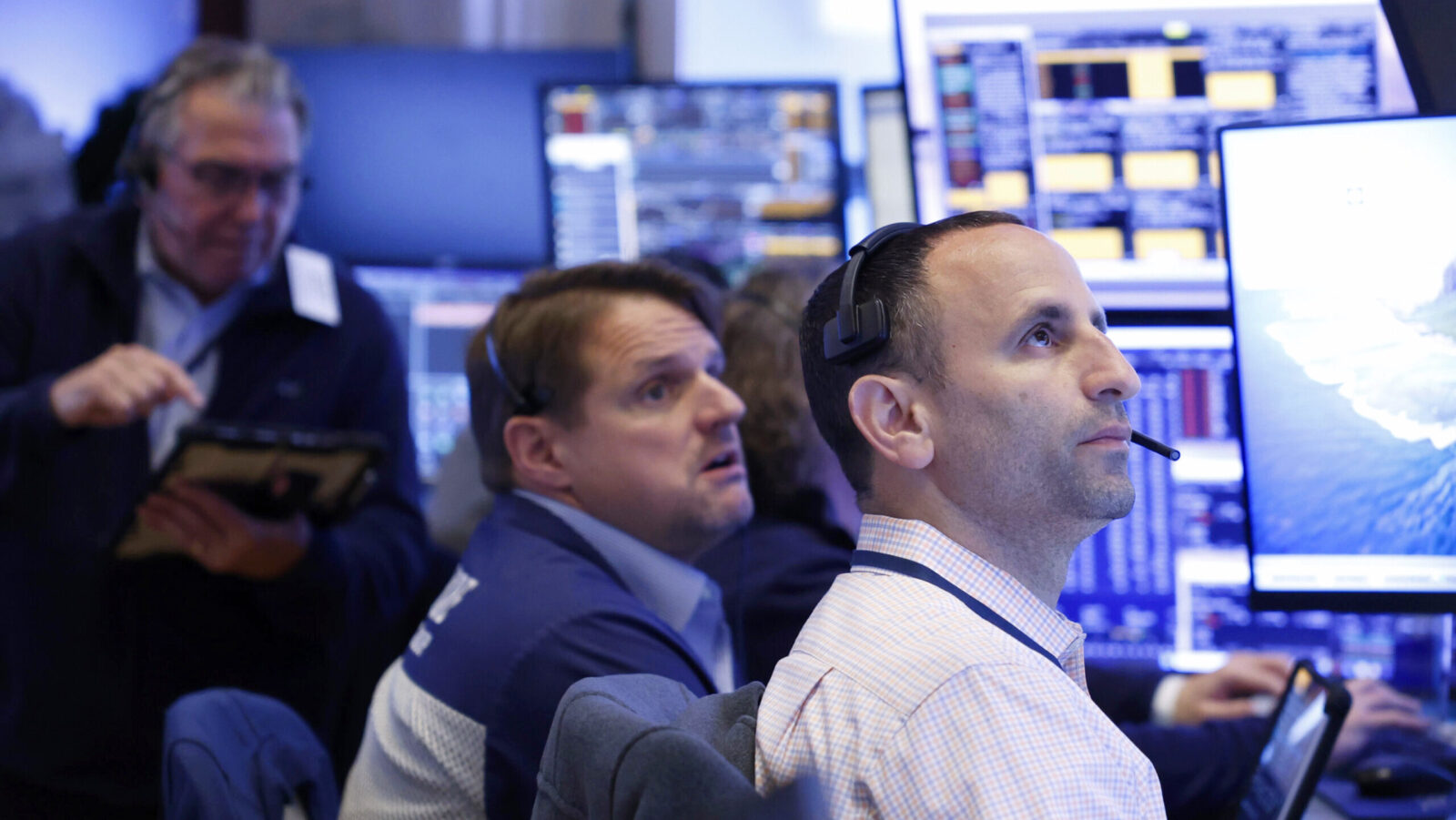Good morning.
Thirty-something renters, it’s not just you. The median age of a first-time homebuyer in the United States is now a record 40, according to a National Association of Realtors survey of transactions from July 2024 to June 2025. When the association first conducted the survey in 1981, that age was 29.
The 11-year shift reflects just how challenging housing affordability has become for young adults, with the current median home price of $415,000 more than 50% above 2019 levels. Further underscoring these difficulties, the share of first-time buyers in the housing market was a record low 21%. It’s cold comfort, but at least you’ll have some new data points to share with your 35-year-old roommate over breakfast this morning.
Wall Street Leaders’ Fears of Froth Finally Bubble into Markets

Last month, JPMorgan CEO Jamie Dimon said he considered himself “far more worried” about a significant stock market correction than his Wall Street colleagues. If markets were pricing in a one-in-ten probability of a correction, he’d peg it closer to one in three, he told the BBC.
The others are catching up, however. Goldman Sachs CEO David Solomon and Morgan Stanley CEO Ted Pick issued their own warnings of an equities drawdown on Tuesday at a summit in Hong Kong, which were enough to ignite valuation fears 8,000 miles away in New York.
Listen Up
You know why many believe there is a market bubble. The S&P 500 keeps setting record high after record high, and the index’s forward price-to-earnings ratio of 23.2 is well above its 10-year average of 18.6. Inflation remains elevated. Interest rates remain elevated. The ongoing US federal government shutdown is poised to become the longest ever today.
In recent weeks, however, markets have mostly shrugged off pronouncements from the International Monetary Fund, Fed Chairman Jerome Powell and Bank of England Governor Andrew Bailey that markets are frothy. Same with outgoing Berkshire Hathaway CEO Warren Buffett’s cautious moves from his Midwest perch in Omaha. But after Solomon told the Global Financial Leaders’ Investment Summit on Tuesday that “it’s likely there’ll be a 10% to 20% drawdown in equity markets in the next 12 to 24 months” and Pick agreed, adding he anticipates a 10% to 15% drawdown, investors seemed to take their forecasts to heart:
- The S&P 500 fell 1.2% Tuesday, and the tech-heavy Nasdaq Composite, which offers a better window into highly valued tech and artificial intelligence stocks, fell 2%.
- Tech giant Oracle and chipmaker AMD each fell 3.7%, Nvidia dropped 4%, Tesla tumbled 5.1% and Amazon declined 1.8%. Crucially, there were signs that the selloff was not a reflection of earnings but rather of broader valuation concerns in AI and tech. For example, software-maker Palantir slid 8% despite handily beating estimates and hiking its full-year guidance a day before.
The upside is that Solomon and Pick believe the drawdown will be relatively healthy, not crisis-level. “It’s not something that changes your fundamental, your structural belief as to how you want to allocate capital,” Solomon said. Pick added that the “possibility of drawdowns … that are not driven by some sort of macro cliff effect” is “welcome.”
Taking Private Credit: Equities aren’t the only assets that may be in line for a correction, attendees at the summit were told. UBS Chairman Colm Kelleher became the latest to express concern about the US insurance industry, which has made significant portfolio allocations to private credit. He said the industry is creating a “looming systemic risk” and criticized its use of small credit ratings agencies that only provide their ratings to a limited number of investors.
Rearmament is Here, and Nations Across the Globe are Bulking Up

Last year notched a post-WWII record: sixty-one active conflicts across the globe.1
NATO members have pledged hundreds of billions toward military modernization, and global defense budgets hit $2.7 trillion in 2024, the fastest one-year climb since the Cold War.2
The Global X Defense Tech ETF (SHLD) offers strategic exposure to this wave of spending and rearmament:
- The geopolitical landscape continues to underscore national security priorities, and Global X’s Charting Disruption: Outlook for 2026 and Beyond research expects structural factors to sustain elevated defense spending through 2030.3
- Next-generation military technology has arrived, and militaries are rapidly upgrading their tech capabilities.
This once sleepy part of the economy has awakened, and the floodgates of innovation have blown wide open with a new arena of contractors.
Novo Nordisk’s $10 Billion Bid Ups the Ante in Bidding War for Obesity Biotech Metsera
Metsera is getting Helen of Troy treatment from its suitors.
The weight-loss biotech firm agreed to a $7.3 billion takeover by Pfizer in September, but that isn’t stopping it from entertaining more offers. On Tuesday, Novo Nordisk raised its bid to stop the Pfizer-Metsera marriage to $10 billion from an original $9 billion, which it offered just a week ago. Pfizer’s response? A legal challenge, a plea to Metsera that a deal with Novo Nordisk will never fly with antitrust regulators … and an increased bid of $8 billion.
Metsera Sera
Even if Pfizer prevails, the relationship will likely require some healing. A day after Novo’s initial bid, Pfizer filed a lawsuit against the boards of both Novo and Metsera, alleging a breach of contract. (On the same day, the Federal Trade Commission gave the green light to its $7.3 billion takeover, which was agreed to on September 22.) Then on Monday, Pfizer filed a second lawsuit against the two firms, alleging an “anticompetitive conspiracy” in violation of the Sherman Antitrust Act.
The heated competition is hardly surprising. Metsera may have no approved drugs yet, and fewer than 100 employees, but its pipeline includes promising pills for weight loss, a slice of the industry quickly falling under competitor Eli Lilly’s control. Metsera on Tuesday called Novo’s new $10 billion offer the “superior” bid, but Pfizer has two more business days to come to a new agreement with the company. As the bidding war rages on, a judge has already delivered Pfizer a message in its legal fight for Metsera: Que sera sera, or whatever will be, will be:
- “My strong sense [is] that it would be wrong for this court to inject itself into [an] ongoing topping process that is creating value for Metsera stockholders,” Morgan Zurn, vice chancellor of the Delaware Court of Chancery, said in an emergency hearing over the case on Tuesday. A follow-up hearing is scheduled for today.
- The judge is, unsurprisingly, correct: Novo’s Tuesday bid values Metsera at up to $86.20 per share, a 159% premium to its closing price on the day before Pfizer’s initial offer in September.
Up, Up and Away: What’s more, Metsera’s stock climbed 20% on the bidding war news on Tuesday, closing at $73.18 per share. That’s above Pfizer’s initial $68.43 per-share offer as well as its current $70 per-share bid. Mizuho Securities healthcare strategist Jared Holz told Bloomberg that it’s a sign Wall Street might be anticipating even higher bids to come. As Helen of Troy could tell you, it’s nice to be wanted, but it’s also complicated.

Execs: Your Comp Is Worth More Than You Realize. Options, restricted stock, deferred pay, board income. They all create real wealth. But they can also set tax traps. Join Aspiriant’s Helen Dietz and Nick Ruzette on November 11 and learn how to maximize your post-tax take-home. Register for a talk that’ll take your comp planning to the next level.
Investor Summit Gives Bank of America a Chance to Soothe Angsty Investors
Brian Moynihan, CEO of back-of-the-pack Bank of America, is in the hot seat today as he tries to convince shareholders and analysts that the country’s second-largest bank is at last geared for faster growth.
BofA, which is hosting its first investor day in nearly 15 years, hasn’t disclosed much about what to expect at the meeting, and it didn’t respond to our request for comment. But we’re likely to hear Moynihan declare that the bank is taking on more risk and that higher returns are on the horizon.
BofA’s Struggles
Surpassed in size by only JPMorgan Chase, Bank of America holds $3.4 trillion in total assets and operates more than 3,600 branches in the country. It’s among the best at traditional banking and deposit-taking, but that’s not enough in today’s competitive landscape. While the bank’s peers have been expanding into less traditional areas, BofA has lagged in key segments such as wealth management, credit cards, and loan growth.
There are also the bank’s balance sheet missteps. When liquidity surged in 2020, BofA put that extra cash to work buying long-duration securities with low yields. As interest rates started rising, those securities remained stuck on the bank’s balance sheet. Net interest margins took a dive compared with its peers, pressuring overall profitability. But it’s beginning to turn that around:
- BofA’s net interest income rose 9% from a year earlier to $15.2 billion in the three months through September, the company reported last month. Net interest margin, which reflects the gap between what banks pay to depositors and charge for loans, rose eight basis points to 2.48%. Overall profit increased 23%, and revenue grew 11%.
- The bank’s net interest income growth has been outperforming JPMorgan’s of late, and Suryansh Sharma, senior equity analyst for Morningstar, estimates that BofA will reap at least four to six more quarters of significant net interest income gains. That could translate into strong profitability, he adds. The bank has previously said it expects record net interest income growth of 6% to 7% this year.
Succession Planning: Experts will also be looking for clues about who is taking the helm after Moynihan. In September, he announced Dean Athanasia and Jim DeMare would become co-presidents while Alastair Borthwick would become chief financial officer. “It’s a three-person horse race to become the next CEO, and this will be a chance for the investment world to analyze them,” Mike Mayo, head of US large-cap bank research at Wells Fargo Securities, said recently on “Bloomberg Markets.”
Extra Upside
- Jeepers, Creepers: Jeep parent company Stellantis is recalling over 320,000 Grand Cherokee and Wrangler models sold in the 2020s, warning there is a fire risk related to their batteries and that vehicle owners should park outside and away from their homes.
- Pie for Sale: Yum! Brands said it is considering offloading its struggling Pizza Hut chain, one day after Denny’s agreed to sell itself in a $620 million go-private deal.
- The Defense Tech Sector Is Taking Off. Global defense spending hit $2.7 trillion in 2024, the fastest surge since the Cold War. NATO members pledged to double military budgets by 2035. The Global X Defense Tech ETF (SHLD) tracks companies defining the next generation of military tech. Explore SHLD Now.*
* Partner
Just For Fun
Disclaimer
Sources
- Peace Research Institute Oslo (PRIO). (2025, January). Trends in Armed Conflict, 1946–2024.
- Stockholm International Peace Research Institute (SIPRI). (2025, April 28). Military Expenditure Database.
- Liang, X., Tian, N., da Silva, D.L., Scarazatto, L., Karim, Z.A., Ricard, J.G. (2025, April). Trends in World Military Expenditure, 2024. Stockholm International Peace Research Institute. As cited in Global X Charting Disruption: Outlook for 2026 and Beyond (2025) www.ChartingDisruption.com.

